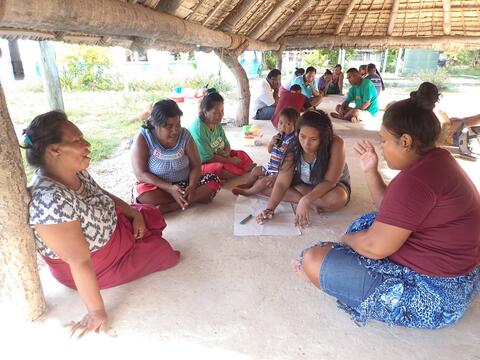Shifting the focus towards a more people-centered approach to deliver equitable benefits and inclusive services across all work areas
Pacific peoples’ lives are deeply interwoven with the marine space. The ocean is home, workplace, a social and recreational space, and a development asset. It provides people with key necessities such as food and livelihoods. Many cultural and traditional practices are connected to the ocean. Women and men’s traditional environmental knowledge, for example, is passed on to next generations and contributes to sustainable and resilient lifestyles in co-existence with marine life. Uplifting the social dimension and recognising the rights to food, to gender equality, and to participation as fundamental human rights in the context of small-scale fisheries, is a key guiding approach that supports overarching regional goals on creating more equitable benefits and inclusive decision making.

We aim at mainstreaming gender equality, social inclusion (GSI) and human rights-based approaches (HRBA) into all cycles of our work – from planning to implementation. FAME has invested in a tailored application of GSI and HRBA concepts through our work. We have developed tools in the context of coastal fisheries and aquaculture to provide more practical guidance on the what and how of undertaking mainstreaming activities for fisheries practitioners. By integrating GSI and HRBA lenses into socio-economic surveys, these support a GSI perspective on socio-economic situations, as well as livelihood assessments that have focused on women dominated fisheries which are often overlooked, and legislative analysis focused on the gender and human rights responsiveness of coastal fisheries and aquaculture legal frameworks.
Evidence-based support
We work to support our member countries and partner organisations in understanding the different GSI patterns, gendered roles in the fisheries space and the various obstacles and constraints people face due to their social status, age, gender, (dis)abilities or migrant status. By building a stronger evidence base which incorporates disaggregated data by sex, age, ethnicity, or other relevant social categories as well as more analytical findings, members can develop policies, laws, programmes and actions with GSI and HRBA themes.
We focus on GSI analysis, for example through national gender and fisheries analysis or integrated GSI and HRBA research, in collaboration with the Human Rights and Social Development division at SPC. These analyses can support countries with an increased understanding on the roles, structural barriers and opportunities for women and men, boys and girls, and other groups more likely to be left out. GSI analysis provides countries with the knowledge on who is doing what, using what gear/techniques, the level of engagement of women and men along value-chains, gendered use of marine spaces and ecosystem services, constraints to access and use resources, cultural barriers, access to finances, training and skills development that are different for women, men, youths, and other marginalised groups. This information will enable countries to include GSI lenses and tailor services and programmes to the needs of their communities.
Applying GSI and HRBA considerations into service delivery, policy, and legal frameworks and actions will greatly support member countries:
- to reduce poverty by achieving a more equitable share of benefits;
- to empower coastal fisheries communities as rights holders, which will create more ownership, a sense of pride and dignity;
- to enable participation and diverse voices in decision making on access to and use of resources.
Working in this space is not always easy because GSI and human rights topics can be a delicate area, sometimes due to misconceptions. Providing training, sensitisations, capacity-building, awareness, and mentoring are also key aspects of our work and help enable the environment to achieve sustainable development goals (SDG) on gender equality, inclusive societies and reduced inequalities as these are deeply intertwined with environmental goals such as SDG14 - life below water.
